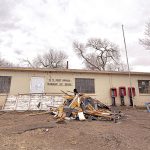
Letters: ‘Harvard dean has power to ensure Natives are represented’

As a second-year masters in public policy student and a member of the Navajo Nation, I welcome Douglas Elmendorf dean to Harvard Kennedy School.
… Native issues are being prioritized by today’s leaders. They are also part of our legacy. Our namesake, President Kennedy, took sovereignty seriously and engaged tribal leaders with deep reverence. He believed that the U.S. had a “moral obligation to our first Americans,” through substantive social programs and respect for the cultural heritage of the people who walked this land first.
Commitment to service and a professed dedication to diversity are cornerstones of our school’s identity. Our brochures proclaim: “the student body represents over 80 countries from every region of the world, bringing diverse perspectives to HKS.” But the voices of the colonized, oppressed, of indigenous and native peoples, are not made welcome. We must ask what we can do – not only for the powerful, but for Indian Country, too.
During the first week of school, students’ national flags are proudly displayed throughout the JFK Jr. Forum, but in my two years at HKS, no Native flags have been hung. My flag wasn’t hung. Perhaps it simply didn’t occur to anyone that Native American students represent nations, too.
Flags are symbolic. But my cultural values aren’t taken seriously in the classroom, where conversation is dominated by Western ways of thinking. Sometimes, my values are unwelcome. Don’t question individual property rights as fundamental and inalienable; don’t mention inter-connectedness with our earth; and please, stop harping on the deep, unremitting impacts of militarized solutions to global issues. In MLD 101, Economics, and Policy Analysis, I tried to express these perspectives. Once, someone laughed and said, “What are you, communist?” When I asked how not only the economic value, but the cultural value of salmon – sacred to the Native peoples of my home state, who call themselves “Salmon People” – might be incorporated into a cost-benefit analysis, I was met with painful silence.
Heads of state, political, corporate, and non-profit leaders, media and even comedians from across the globe have had the honor of speaking on stage at the forum in my time at HKS. I have yet to see a tribal leader take that stage.
As an academic, a professional, and an individual at HKS, I leave my Native-ness at the door. … My great-grandmother, whose parents were killed on the Long Walk of the Navajo, was taken from her home and sent to an Indian school. These schools were designed to “kill the Indian, save the man.” Grandma Cora was beaten for speaking Navajo. She was forced – violently – to leave her Native-ness behind.
Indigenous cultures, languages, and ways are being decimated all over the world. As we face the devastating effects of climate change, of deep social and economic inequality, violence and injustice, Native people can teach us much about resiliency and healing. But for this to happen, Natives must have an opportunity to share their deep, rich knowledge and experience.
The pernicious silencing of Natives and Native issues is a loss for the HKS community. We lose out on learning from the creative, innovative, work being done in Indian Country to confront global problems. Tribes are responding to mass incarceration through community rehabilitation, innovating in education and violence prevention through cultural competency, developing community health programs to combat pervasive health issues. These efforts can inform and inspire future leaders to solve shared problems. But without Native students, Native issues, values, and solutions are excluded.
And so our graduates and future leaders remain ignorant to the issues Native peoples face, we fail to live up to the call to ask what we can do.
Jackson Slim Brossy, HKS 2010, was recently named the executive director of the Navajo Nation’s Washington, D.C. office.
Jackson attended HKS with a cohort of Native students. Then, our school better reflected Kennedy’s commitment to our moral obligation to Native communities. But over the past four years, Native applications have plummeted. There is only one other Native American in my graduating class. In 2017, no Native students will graduate HKS with a master’s in public policy.
We urgently need to recruit and retain Native American students.
While some may argue that prioritizing Native admissions will crowd out other qualified students, it is a question of who we want in our community, who we want to learn with, whose perspectives we want represented. There are so many students who go from HKS to McKinsey that the school almost feels like a conduit for corporate, for-profit consulting firms – at the expense of historically marginalized and silenced people. Do we want to be the pipeline that extracts future leaders for private consulting, or do we want to sow fertile ground for those who will lead meaningful change and honor our legacy?
At HKS’ recent celebration of Native American Heritage Month, Dr. Brabyboy (Lumbee) of Arizona State University informed me that when I cross the stage at graduation this May, I will represent 2,500 Native American high schoolers who will never have the opportunity to attend graduate school.
It will be a lonely walk, the weight of 2,500 Native youth squarely on my shoulders.
At the head of this amazing institution, the dean has the power to ensure that Native peoples are represented.
Theodora Simon
Cambridge, Mass.
(Hometown: Pacific Northwest)
Searching for former Lukachukai residents
Louis and Theresa Yazzie and their children, Jonah, Wallace, Leslie, and Patricia lived on the north end of Beaver Mesa (Louis worked in the uranium mines) above Gateway, Colo., in the 1960s. They were living in Lukachukai, Ariz., at that time. My husband (Wally Winfield) at that time worked on a cattle ranch on the south end of Beaver Mesa and was the school bus driver for the one-room school of 30 children in grades 1-6. He is deceased.
I, mother of the Winfield adult children, can be contacted at 4244 Hampton Ridge, Lexington, KY 40514. My phone number is 859-223-0313. Or contact can be made with Bill Winfield at P.O. Box 116, Moab, UT, 775-690-0550. He was able to meet up with Jonah last year but lost his number.
Dannette B. Bergin (formerly Winfield)
Lexington, Ky.
‘Railroading’ of Utah water settlement violates right to prior, informed consent
I am a 65-year-old grandfather eight times and great chei once. I dearly love my children, I pray they do not come into harm and that they will be OK in their later years. This letter is written on their behalf, all of our children and grandchildren of the future. With the swirling myriad troubles over the world, the exponentially increasing population, the inevitable shortages of food, water, and the unrelenting assault on our lands and resources; to think on the future times of our children is worrisome.
The Navajo Nation Council approved the proposed Utah Water Settlement. I do not fully understand the intricacies and impacts of the settlement, I do know that it is complex, serious and extremely important. I cannot say conclusively why the proposed settlement is wrong, I defer to my sisters and brothers who declare unequivocally that something is wrong. Should we decide on this settlement if something might be wrong with it, if it could deny water to our children someday?
I believe it is wrong the Council is proceeding with a federal/state process where the Council and the speaker are the only authority to decide on the proposed language. The president will not have his say on the agreement until after it has been approved by Utah and the U.S. Congress, thus the president did not concur on the proposed language or did he?
As a sovereign nation, do we not have the capacity and authority to assert what process we will subscribe to instead of being dutifully compliant with a foreign imposed process?
It is wrong that an agreement of this tremendous import and implication is fast-tracked through the review and legislative process over the objection of reasonable argument. This “railroading” denies us the responsibility to protect and preserve our waters for our future generations and it violates our right to free, prior and informed consent.
It is wrong that President Begaye as the principal Navajo leader has been silent on this issue, he is obligated to insure that our future children have the water they will need. He is supposed to be the front line in repelling the intrusion and imposition of foreign processes, protecting our sovereignty.
It is wrong for President Begaye to allow a non-Diné who has long worn out his welcome to set the agenda and dictate to us how we should use our waters. With all the high-powered technicians and legal minds that are on the tribal payroll now, why is there silence? Is the water issue so difficult and complicated that only this visitor bilagaana can comprehend it? Silence is complicity.
The current leadership needs to stop this foreign manipulation and continued exploitation. They need to show us leadership and show us what this perceived notion of sovereignty is. They need to show touted transparency by putting this issue on the table, let us discuss it openly and freely. If our concerns are unfounded, show us specifically why. Show us courage and talk to us as equals and determine together what is best for our children.
At our chapter meeting this Sunday starting at high noon Robyn Jackson will report on the forestry concern, Janene Yazzie will report on the river contamination study, and we will have an unbias report on the so-called water settlement.
Chili Yazzie
Shiprock, N.M.
Urban Outfitters: Right the wrong
Since 2008, the Navajo Nation has been working to right the wrong that has been committed by the global Urban Outfitters – who use the term “Navajo” without permission in the selling of their products which included underwear, alcohol flasks and such.
Although the term “Navajo” is used in many areas of many communities it is a term that is forefront in the lives of the Navajo people. Our Navajo government has done much to protect and preserve the tribal and cultural community of its people, yet they cannot always protect against theft and the blatant disrespect of issues such as this.
History has shown how the mainstream non-Navajo entities have taken advantage of the Navajo people, We have been prisoners of war at Fort Sumner, N.M., we have been taken by force to the infamous Indian Boarding Schools, we have been and still are called “savage,” “drunks,” “squaws,” and many other distasteful terms, but through it all we continue our vision of Iiná, Life. The term “Navajo” is what the world knows us as, but we know what we do have our own expression for who we are in our Indigenous tongue.
This issue between the tribe and the corporate Urban Outfitters is important because it concerns the implementation of Navajo tribal sovereignty and the demand for justice for the Navajo people in the 21st century. My people are highly educated and at times must use education as a weapon against tyranny. Some may laugh and label this lawsuit as frivolous, but be sure this fight we fight is so much more than what has floated to the top.
People need to educate themselves on this current issue we as a nation face, our fight is about human dignity and human respect. Below is an excerpt from the article titled “Navajo Nation seeks millions from Urban Outfitters for using tribe’s name.”
According to the current Chicago Tribune article, “The geometric prints popular in clothing often are inspired by Native American designs. Urban Outfitters said it started using the ‘Navajo’ or ‘Navaho’ name on its products and in marketing as early as July 2001, when the fashion trend was in full swing. Its subsidiaries followed suit, with the companies selling cuffs, necklaces, jackets, pants, a flask and panties, among other merchandise. The companies said they quit selling the products after hearing of the tribe’s lawsuit. The Navajo Nation holds trademarks on the ‘Navajo’ name for things like clothing, footwear and online retail sales.”
So, just because it’s “trendy” does not give precedence to disrespect and steal an entire culture of people. Please visit my blog at http://indigenousadornment.blogspot.com/
Venaya Yazzie
Huerfano, NM
To read the full article, pick up your copy of the Navajo Times at your nearest newsstand Thursday mornings!
Are you a digital subscriber? Read the most recent three weeks of stories by logging in to your online account.







 Highway 264,
Highway 264, I-40, WB @ Winslow
I-40, WB @ Winslow